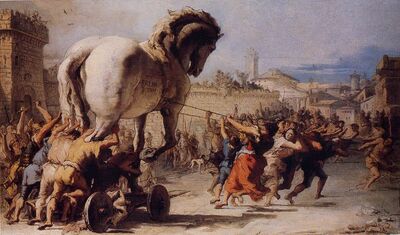
Artist Giandomenico Tiepolo's depiction of the Trojan Horse
The Iliad is an epic written by Homer about the Trojan War. It takes place circa 8th century BCE[1], although its time period, time written, and even historic accuracy are disputed.
Ancient Greece[]

Greece during the Illiad. Note Troy on the Northwest shoreboard of Anatolia
At the time of The Iliad, there was no unified "Greece." In its stead was a collection of poleis, or city states, held together in small groups by alliances, and often full of strife. There were a few key poleis who had considerable control over the others including Sparta, at this time controlled by King Menelaus, who was married to Helena.[2]
For the most part, the Greek city-states were autonomous, and shared certain common traits, such as walls, currency, social classes, and ruling bodies. The term polis not only applies to the city itself, though, as it includes the surrounding areas under the political jurisdiction of the city, such as suburbs and countryside. City states also provided their own military forces, which made alliances such as that in the book essential for large-scale warfare.[2]
The Judgement of Paris[]

The Judgement of Paris
The dieties Pelus and Thetis were holding a wedding, and all gods except Eris (the goddess of discord, who the gods shared a common distaste for) were invited. In her ire she, true to her name, decided to create strife within the wedding so that it may be ruined. The threw a golden apple into a crowd of goddesses, including Hera, Athena, and Aphrodite, on it written "To the Fairest." These three goddesses - the wife of Zeus, the daughter of Zeus, and the goddess of love - fought contemptuously over to whom it was intended. [3]
To settle the dispute, the goddesses inquired of Zeus, essentially asking him to say which woman was the most attractive. With great wisdom, Zeus delegated this responsibility to a mortal, Paris of Troy. Hermes brought the goddesses to this shepherd, who presented themselves naked; first came Hera, holding her sign of authority and presenting Paris with the apple, then came Athena, carrying a spear, and finally Aphrodite in all her beauty. [4] Each goddess presented Paris with a bribe to settle the dispute. Hera offered to make him king of all men if he chose her; Athena promised glory and victory in battle; Aphrodite promised the most beautiful woman in the world. Paris chose Aphrodite's offer[3], which later consequently sided Athena and Helena with the Greeks when support for the war was partitioned among the gods.
References[]
- ↑ http://en.wikipedia.org/wiki/Iliad#Date_and_textual_history
- ↑ 2.0 2.1 Wikpedia: http://en.wikipedia.org/wiki/Polis
- ↑ 3.0 3.1 Theoi: http://www.theoi.com/Olympios/JudgementParis.html
- ↑ British Museum: https://www.britishmuseum.org/explore/online_tours/greece/the_myth_of_the_trojan_war/the_judgement_of_paris.aspx